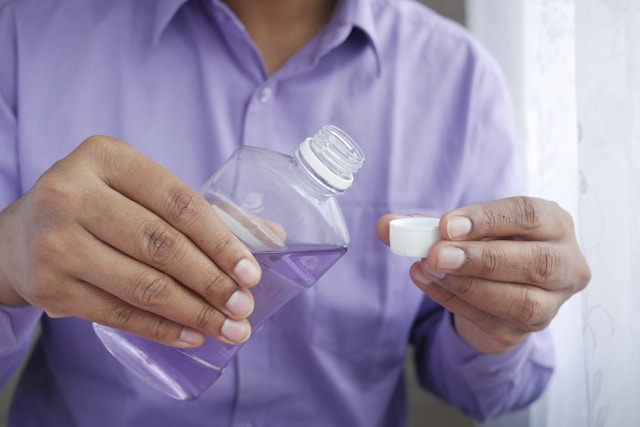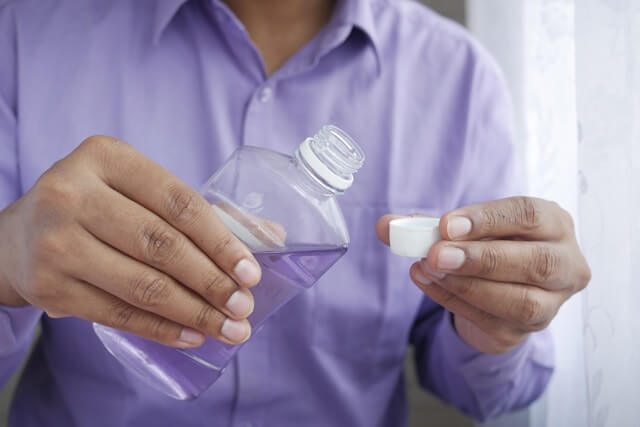Mouthwashes have a lot of benefits as well as some negative effects or side effects. That is why we must follow any instructions on how to use them. People who don’t adhere to the instructions on how to use a mouthwash product may not get the best from the product and also stand risk of suffering one or two adverse effects from using the products.
What are the Constituents of a Mouthwash?
A typical mouthwash is a mixture that contains basically water or alcohol, surfactants (sodium lauryl sulphate ), sweeteners (e.g. xylitol), preservatives, colouring agent, flavouring agent, anticaries agent (e.g. sodium fluoride), and antimicrobial substance (e.g. chlorhexidine, cetylpyridinium chloride).
According to the American Dental Association (ADA), there are two types of mouthwashes – cosmetic and therapeutic. Cosmetic mouthwashes have no therapeutic effects but may offer other benefits such as controlling bad breath temporarily. They do not contain the major constituents that can eliminate bacteria and control dental plaque.
When should a mouthwash be used?
Mouthwashes are not toothpastes. Even though they help in maintaining good oral hygiene, they can only be used as adjuncts to brushing. They should not replace the mechanical removal of dental plaque by brushing with a toothbrush and toothpaste and they should not be used frequently also. Else, instead of the expected benefits, frequent use of mouthwashes may cause some undesirable effects to your dental health.
Someone may want to ask, when should mouthwash be used? It is safer to use mouthwash prescribed by your dentist.
There are two major reasons a dentist may want to prescribe mouthwash for you. First for a preventive purpose and second for therapy. It is not advisable to indulge in indiscriminate use of mouthwashes as this could lead to abuse of the products. Always consult your dentist to know the formulation that will be best for you.
Preventive and Therapeutic Uses Of Mouthwash
As mentioned earlier, mouthwashes can either be used to prevent dental diseases or to treat dental problems. Here are some of the indications for use of mouthwashes.
Reduce Buildup of Dental Plaque
Dental plaque is the primary cause of periodontal (gum and other supporting structures of the teeth) diseases. Accumulation of plaque on the teeth and gingiva (gums) is detrimental to your dental health. It creates an enabling environment for the bacteria that destroy teeth supporting structures to fester and cause dental problems such as gingivitis, periodontitis and other forms of periodontal diseases. Dental plaque is also implicated in the development of tooth decay.
The use of antimicrobial mouthwashes will eliminate these destructive bacteria and also reduce plaque formation, hence helping to maintain oral health.
Helps in Fighting Dental Caries
Certain mouthwashes are formulated with anticaries agents such as fluoride. This helps to fight against tooth decay. Fluoride strengthens the teeth and makes it difficult for dental cavities to develop. It also has some antibacterial effects, which is important in eliminating destructive bacteria within the oral cavity.
Regular use of fluoride-containing mouthwashes will help to reduce tooth decay. Children above the age of 6 years that are at risk of developing multiple dental cavities will benefit from regular use of mouthwashes that contain fluoride.
Role in the Treatment of Bad Breath
Mouthwashes are quite beneficial in the treatment of halitosis, especially if the causes of the malodour are from within the oral cavity.
Mouthwashes alone will not be very effective in treating bad breath. To get maximum benefits from mouthwashes, they have to be used after carrying out appropriate dental procedures like scaling and polishing, filling of cavities, and periodontal therapy.
The use of mouthwash here is aimed at eliminating certain destructive bacteria within the mouth capable of causing oral malodour.
Corsodyl amongst other mouthwashes is usually prescribed by dentists because it contains chlorhexidine, which possesses an antimicrobial effect.
Role in the Treatment of Gingivitis and Periodontal Diseases
gingivitis is the inflammation of the tooth gum marked by redness and oedema of the gums, bleeding on brushing or bleeding from the gums during dental examination.
Periodontal diseases include diseases of the tooth supporting structures like gingiva, alveolar bone, periodontal ligaments, periodontal fibres and cementum.
Signs of periodontal disease include:
- Swollen gums
- Red gum
- Bleeding gums at the slightest provocation
- Periodontal pockets evidenced by food packing into the gums in between teeth (interdental gingiva)
- Bad breath
- Tooth loss
Periodontal diseases are serious dental problems and should not be taken lightly. If you notice any of the above signs, you must visit a dentist for treatment. Usually after completing treatment, dentists prescribe antimicrobial mouthwashes to reduce bacterial load and control plaque accumulation.
Adverse Effects of Using Mouthwashes
Though mouthwashes have a lot of benefits, they also cause some adverse effects especially when they are used indiscriminately or without the supervision of a dental professional. Let us take a look into some of the adverse effects associated with the use of mouthwashes.
Teeth Staining
One of the most significant negative effects of mouthwash use is teeth staining. Certain mouthwashes, especially those that contain chlorhexidine stain the teeth when used for prolonged periods of time, that is, more than two weeks.
A study by Eslami et al., showed that mouthwashes containing metal nanoparticles produced comparable or even greater enamel discoloration compared to chlorhexidine.
Stains from mouthwashes are not easily removed by brushing. If you notice any teeth discoloration after use of mouthwash, visit your dentist for a professional teeth cleaning procedure also called scaling and polishing.
Taste Alteration
Reduction in taste perception may occur in some people who use mouthwashes. Chlorhexidine may result in reduced salt and bitter taste perception. This reduction in taste perception is known as hypogeusia.
Hypogeusia from mouthwashes is temporary, and is usually relieved a few days after stopping mouthwash use. If you experience a reduction in the perception of salt and bitter tastes, you should not be alarmed, because this adverse effect is reversible.
Dry Mouth
According to WebMD, mouthwashes that contain alcohol or peroxide can predispose to suffering from dry mouth. Dry mouth caused by mouthwash is reversible once you discontinue the use of the mouthwash, although this may take a couple of days to occur.
Irritation of Oral Mucosa
Oral mucosa irritation is another adverse effect that one may experience with the use of mouthwashes.according to Medscape, certain Ingredients used in mouthwashes may serve as irritants causing inflammation of the oral mucosa resulting in irritant or allergic contact stomatitis.
Some of these ingredients include:
- Flavouring agents e.g. eugenol, menthol
- Chlorhexidine and quaternary ammonium compounds
If you notice any sign of irritation in any part of your mouth and tongue while using mouthwash, it is advisable you discontinue use of such mouthwash.
Destruction Oral Microflora
Indiscriminate use of mouthwashes can lead to the killing of the normal flora within the oral cavity, which may have some negative effects on the oral health The destruction of the oral normal flora may result in imbalance in the distribution of the normal flora. This imbalance may create an opportunity for exogenous organisms to cause infection.
When You Should Not Use Mouthwash
In as much as mouthwashes are important for maintaining good oral hygiene, they should not be used in any of these occasions:
- When there are sores in the mouth. Mouthwash may worsen sores and increase irritations.
- If you experience allergic reactions with mouthwash use.
Conclusion
When mouthwashes are used correctly and according to prescription, they offer a lot of benefits. However, Adverse effects may be experienced if these mouthwashes are used for longer periods of time. If you notice any negative effects while using mouthwashes, discontinue use and consult your dentist.









